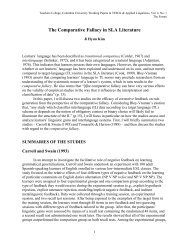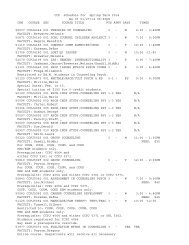UNICEF Mongolia - Teachers College Columbia University
UNICEF Mongolia - Teachers College Columbia University
UNICEF Mongolia - Teachers College Columbia University
You also want an ePaper? Increase the reach of your titles
YUMPU automatically turns print PDFs into web optimized ePapers that Google loves.
CHAPTER 4: THE IMPLEMENTATION OF THE 2007 SALARY REFORM AT SCHOOL LEVEL<br />
1<br />
2<br />
3<br />
4<br />
5<br />
6<br />
TEACHERS IN MONGOLIA: AN EMPIRICAL STUDY ON RECRUITMENT INTO TEACHING,<br />
PROFESSIONAL DEVELOPMENT, AND RETENTION OF TEACHERS<br />
with their salary. In fact, one is surprised how much teachers complain about their salary. There is a<br />
culture of complaint among teachers in <strong>Mongolia</strong> that deserves explanaon. A few possible reasons for<br />
this dissasfacon come to mind, especially as teachers tend to compare their salaries with what others<br />
make and with what they have to pay in terms of living expenses. Some comparisons made are:<br />
• Comparison with the private sector: Salaries in the private sector are much higher and teachers<br />
observe that their peers who le the public sector have a much higher income.<br />
• Comparison with administrators: There exist unofficial sources of income at the school level,<br />
especially for principals and accountants, and teachers find it unfair that they have to rely only<br />
on official sources.<br />
• Comparison with actual living expenses: <strong>Teachers</strong> are heavily indebted and are in a perpetual<br />
crisis with regard to salary loans. Every month significant deducons are made from their<br />
income to repay their loans, leaving them with very small earnings.<br />
It is important to understand the mindset of teachers and their frame of reference in order to understand<br />
why they express their dissasfacon. However, even though the subjecve assessment of teachers<br />
needs to be taken into account, there is no ground for complaint about salaries when one considers that<br />
the teaching job in <strong>Mongolia</strong> is, in effect, a part-me job. Only in a handful of schools that we visited<br />
were teachers expected to stay on the school premises, grade papers, prepare lessons, or meet with<br />
students, teachers, school administrators or parents. The typical scenario is that teachers leave school<br />
upon compleon of the daily instrucon. As a result, they work on average 20.5 hours/week at the<br />
school and a few more hours at home for lesson preparaon and grading. In addion, the school year<br />
consists of 34 weeks, and is therefore relavely short. There were two reasons given for why teachers do<br />
not normally work 40 hours per week:<br />
• Space: Almost all schools in <strong>Mongolia</strong> teach in two shis and very few schools have a <strong>Teachers</strong>’<br />
Room that is large enough to be used as a workplace for teachers. Unlike schools in other<br />
countries, there is no space for teachers to work except for when they teach. In other countries,<br />
teachers have an office at the school (e.g., in Japan) or have their own classroom (e.g., in United<br />
States) that they can use for work.<br />
• Control: Many educaon managers pointed out that there are limits to how much they can<br />
exert their authority to make teachers work at the school or stay engaged beyond the actual<br />
teaching load.<br />
• Unlike teachers who are permied to teach addional hours and leave the school premises<br />
upon compleon of the teaching load, educaon managers have to stay and work for 40 hours.<br />
In addion, they are not entled to the kind of seniority bonuses that teachers receive aer<br />
five, ten, and fieen years of teaching. They also do not enjoy the privileges or the autonomy<br />
that principals have to secure addional income from bribes and other non-official sources.<br />
They, therefore, find their middle posion (“sandwich”) unpleasant between being de facto an<br />
overworked teacher and an underpaid administrator. The majority of the educaon managers<br />
was dissasfied with their posion and would have preferred to work as regular teachers.<br />
72




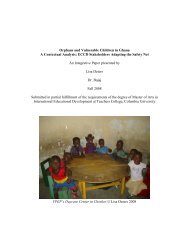
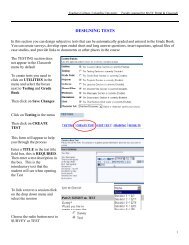
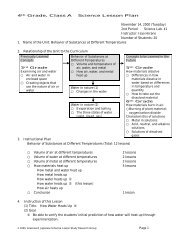

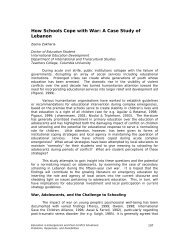




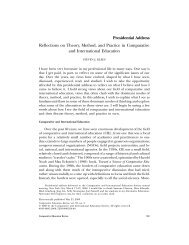
![TC Tod[...].pdf - Teachers College Columbia University](https://img.yumpu.com/27074883/1/190x252/tc-todpdf-teachers-college-columbia-university.jpg?quality=85)

